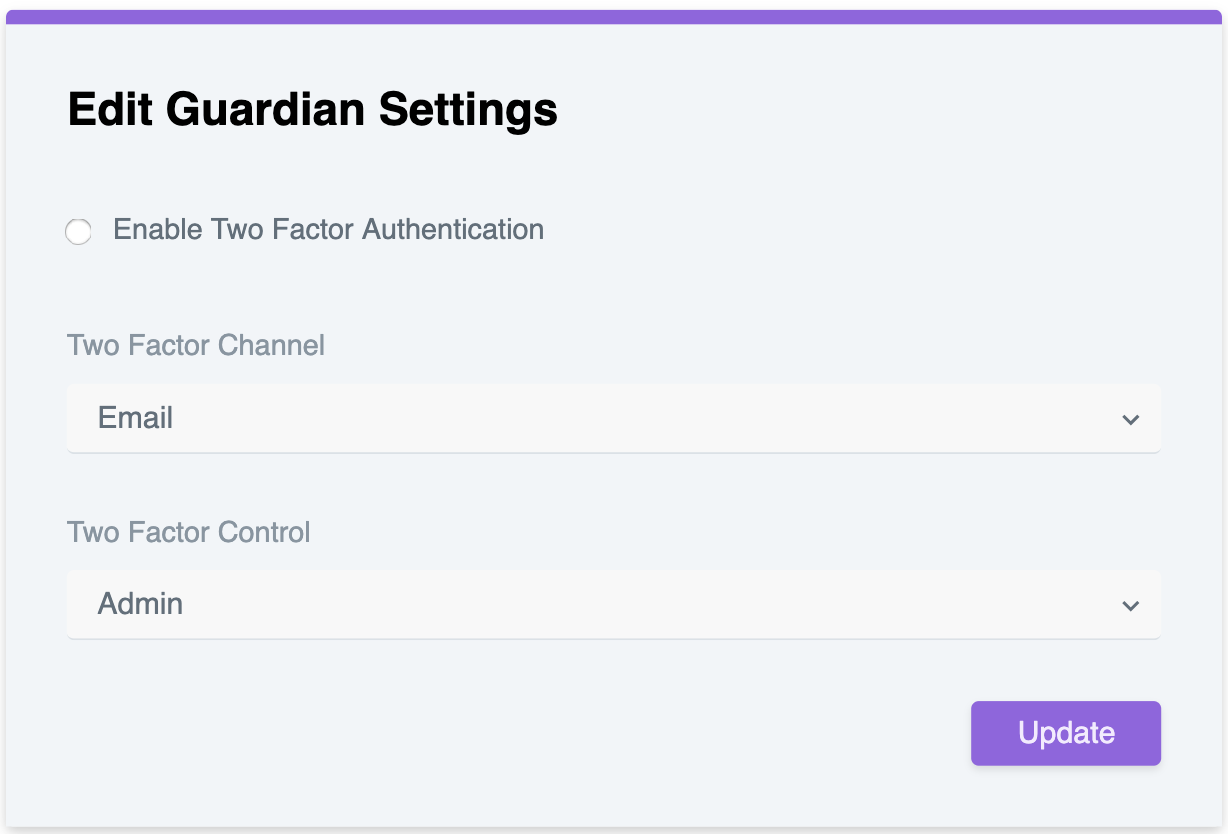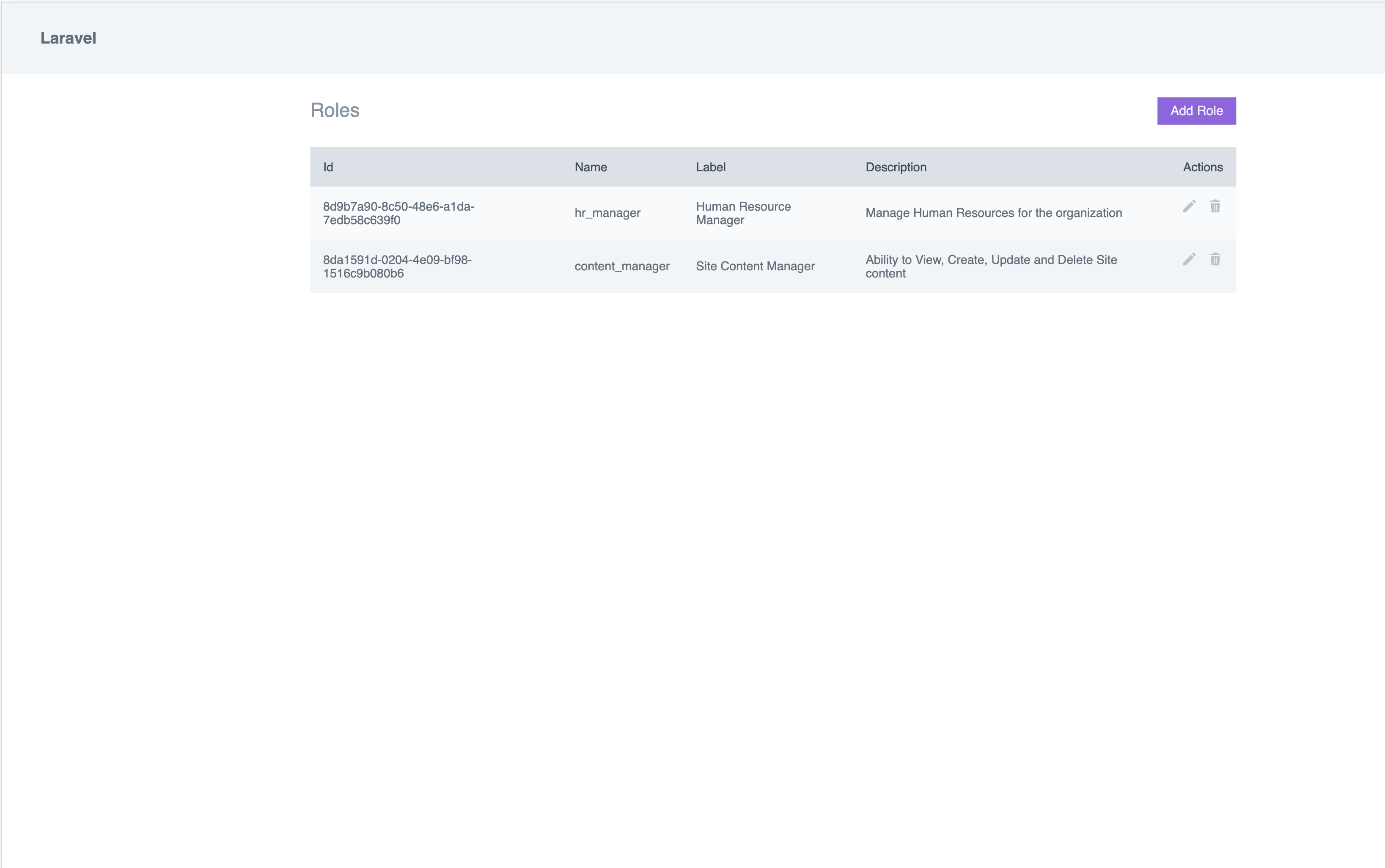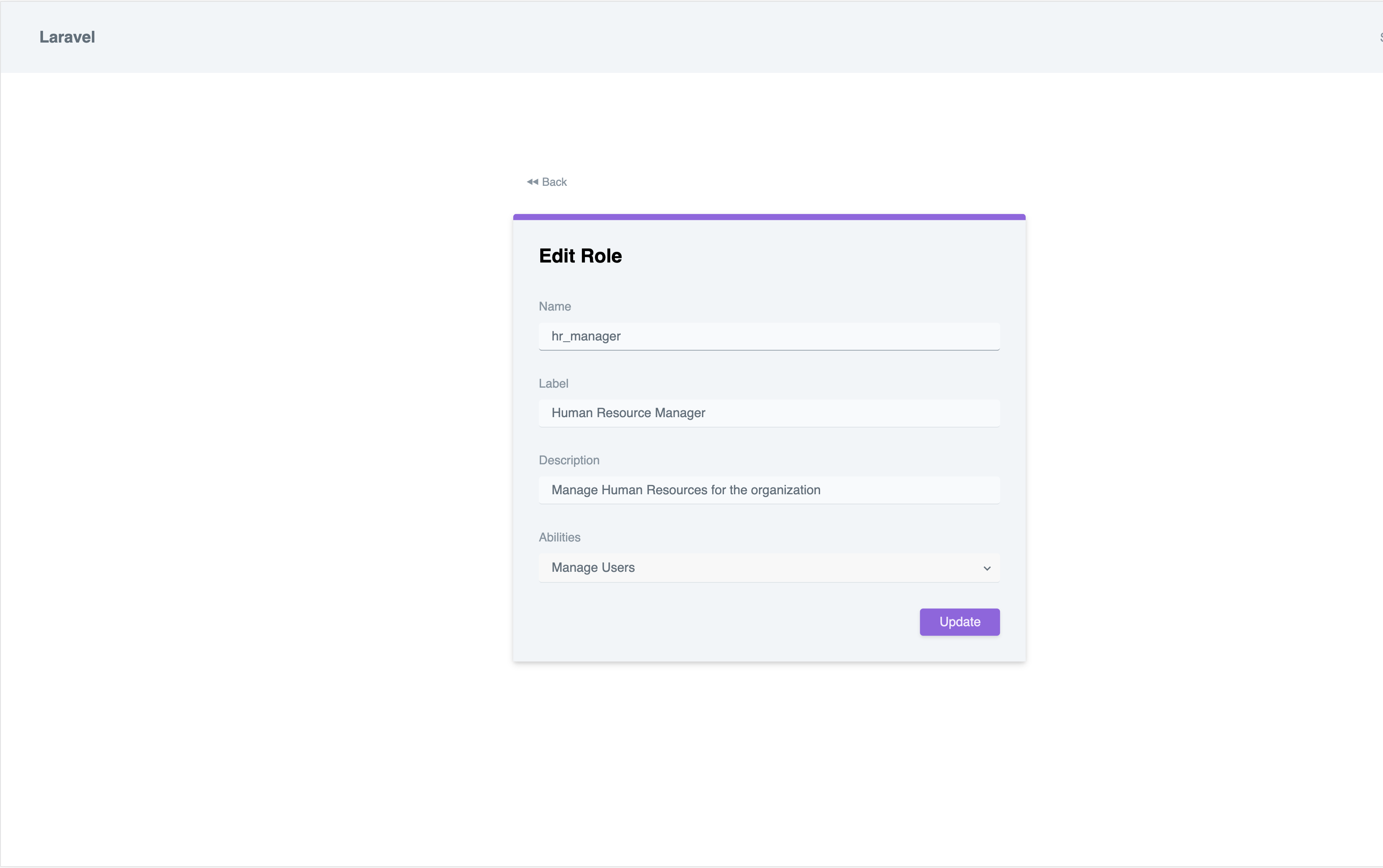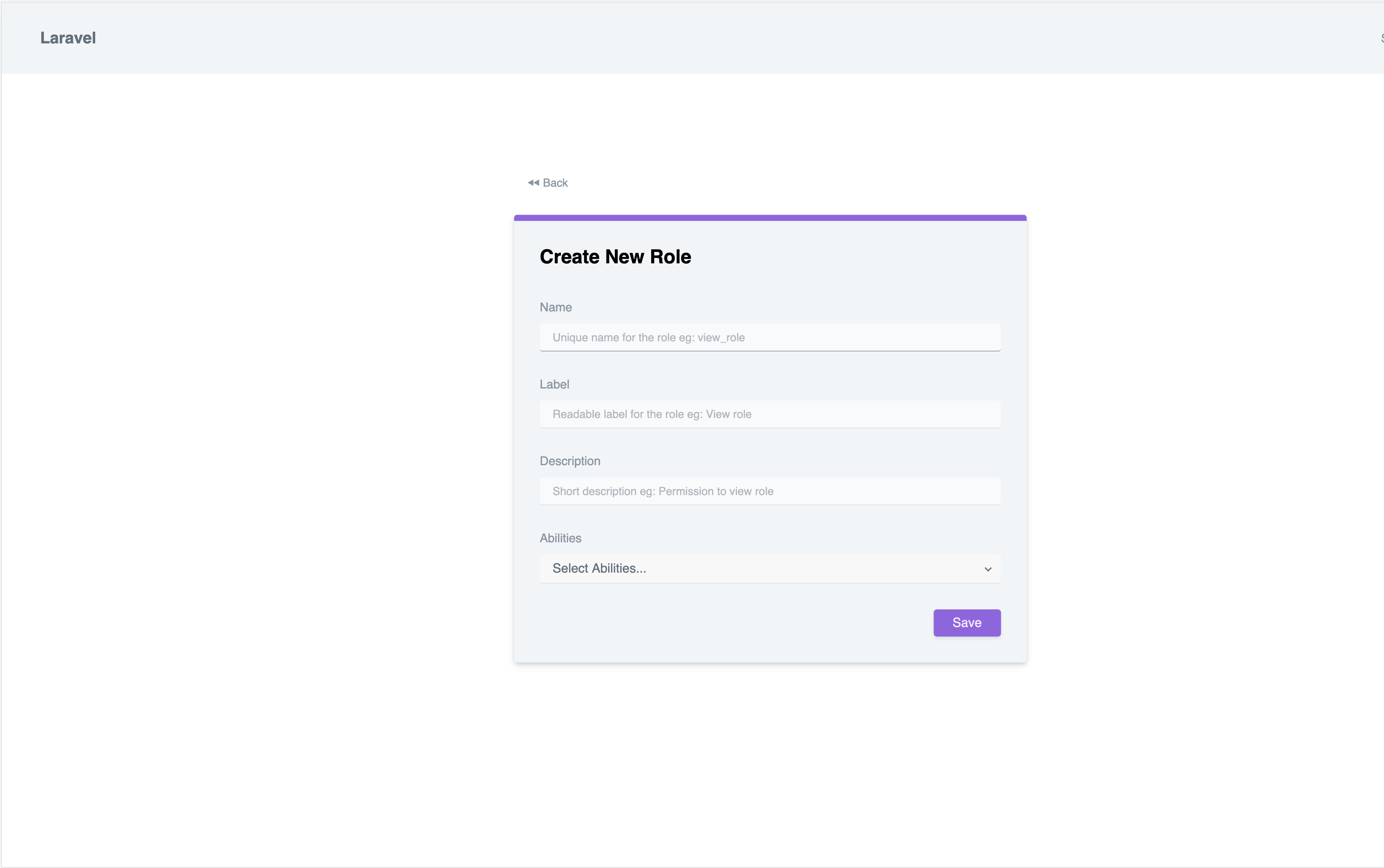thinkstudeo / laravel-rakshak
An authentication library for Laravel.
Installs: 8
Dependents: 0
Suggesters: 0
Security: 0
Stars: 1
Watchers: 0
Forks: 0
Open Issues: 0
pkg:composer/thinkstudeo/laravel-rakshak
Requires
- php: >=7.1.3
- doctrine/dbal: ^2.9
- guzzlehttp/guzzle: ^6.3
- illuminate/support: 5.7.*|5.8.*|5.9.*
- moontoast/math: ^1.1
- thinkstudeo/textlocal-notification-channel: ^1.0
Requires (Dev)
- beyondcode/laravel-dump-server: ^1.0
- filp/whoops: ^2.0
- fzaninotto/faker: ^1.4
- mockery/mockery: ^1.0
- nunomaduro/collision: ^2.0
- orchestra/database: 3.7.*|3.8.*
- orchestra/testbench: 3.7.*|3.8.*
- phpunit/phpunit: ^7.5
This package is auto-updated.
Last update: 2026-01-22 21:12:28 UTC
README
This package extends the authentication and authorization in a Lavarel application.
- Roles and Abilities for granular authorization.
- Two Factor Authentication functionality.
- Auth views, Blade directives and Route middleware.
Contents
- Rakshak - Two Factor Authentication & Authorization for Laravel 5.7+
Installation
$ composer require thinkstudeo/laravel-rakshak
Then use the artisan command to install/integrate the package with your Laravel application.
$ php artisan rakshak:install
The artisan command will:
- register the authentication routes
- provide the authentication views (very similar to the
auth:makecommand) - publish the views for managing crud for Roles, Abilities and Rakshak settings
- register two middlewares
rakshak.2fato verify otp, providing 2fa protection for routesroleto provide authorization protection for routes
- publish the package config
rakshak.phpto theconfigfolder
Finally migrate the database
bash $ php artisan migrate
Migration will alter the users table to add
- username
- mobile
- mobile_verified_at
- enable_2fa
- otp_token
- otp_expiry
- otp_channel
- status (for admin to activate/deactivate user)
Migration will add two roles defined in the roles key of the config file.
Only the User having role config('rakshak.roles.super_user') can access the /rakshak/settings route to view and edit the Two Factor settings.
User having either config('rakshak.roles.super_user') or config('rakshak.roles.authorizer')
It is recommended to install the package in a fresh Laravel application
Config
Package config file is published at config/rakshak.php.
It allows to enable Two Factor Authentication - by default it is not enabled. It also allows to replace/modify the notification used for sending the otp and welcome message on registration.
The default notifications are published in the app/Notifications/Rakshak directory. You may modify or replace the notifications and then replace the corresponding config key with the FQCN of your new notification.
<?php return [ /* |-------------------------------------------------------------------------- | Route Prefix |-------------------------------------------------------------------------- | | This value will be used as route prefix for all rakshak routes. | */ 'route_prefix' => 'rakshak', /* |-------------------------------------------------------------------------- | Application's User Model |-------------------------------------------------------------------------- | | Mainly to indicate the primary key type for the User model in your | application - whether its the default bigIncrements or uuid. | */ 'users' => [ 'pk_type' => 'unsignedBigInteger' ], /* |-------------------------------------------------------------------------- | Two Factor Authentication |-------------------------------------------------------------------------- | | Use the below keys to configure the two factor authentication for app. | Switch to enable or disable two factor authentication - enable_2fa. | Notification classes and sms templates for otp and welcome message. | Remember to use approved templates for sms messages in countries | where there are DND restrictions for transactional messaging. | */ 'enable_2fa' => false, 'login' => [ 'email' => ['App\Notifications\Rakshak\LoginOtpMail'], 'sms' => ['App\Notifications\Rakshak\LoginOtpSms'], 'verify_mobile' => ['App\Notifications\Rakshak\VerifyMobileOtpSms'], 'otp_template' => 'Your OTP for ' . config('app.name') . ' is 234567. It is valid for the next 10 minutes only.', 'verify_mobile_sms_template' => '%s: Confirmation code to verify your mobile number is %s.' ], 'register' => [ 'welcome_email' => ['App\Notifications\Rakshak\RegistrationWelcomeEmail'], 'welcome_sms' => ['App\Notifications\Rakshak\RegistrationWelcomeSms'], 'welcome_template' => 'Welcome %s! We are happy to have you onboard. Team %s', ], /* |-------------------------------------------------------------------------- | Authorisation Roles |-------------------------------------------------------------------------- | | Define the name for the super user role. | Define the name for the authorizer user role. | User with authorizer roler can perform crud ops for Role & Ability | */ 'roles' => [ 'super_user' => 'super', 'authorizer' => 'rakshak' ], /* |-------------------------------------------------------------------------- | Sender |-------------------------------------------------------------------------- | | Define the sender for email and sms messages. | */ 'sender' => [ 'email' => [ 'from' => env('RAKSHAK_EMAIL_FROM', config('mail.from.address')), 'name' => env('RAKSHAK_EMAIL_FROM_NAME', config('mail.from.address')) ], 'sms' => [ 'from' => env('TEXTLOCAL_TRANSACTIONAL_SENDER'), 'number' => env('TEXTLOCAL_TRANSACTIONAL_FROM') ] ] ];
You can use any of the Laravel Notification channels for notifications. By default the package includes Textlocal Notification Channel for sms messaging.
Usage
The package provides the option to enable Two Factor Authentication as also the level of control i.e. once an administrator enables the 2fa module it can be applied to all users by the admin or each user can be given the option to enable 2fa for own use.
Two Factor Authentication
Route: /rakshak/settings is also provided for if you want to provide an easy way for other/client admins to control the Two Factor Authentication.
If you want to provide user level control for enabling/disabling Two Factor Authentication, you will need to implement:
- Route and Navigation for user to access the settings area
- Settings view to:
- enable/disable
2fa, select channelsmsor defaultemail - check whether mobile (number) is verified if
smschannel is selected - Button/link to send otp for mobile (number) verification
- enable/disable
HasRakshak trait
The User.php file - as per the config('auth.providers.users.model') is updated to use the HasRakshak trait. The trait provides a number of functions and roles relation to the User.
$user = User::first(); $role = Role::whereName('hr_manager')->first(); $ability = Ability::whereName('manage_users')->first();
Adding and Retracting Ability to a Role
// You can add an existing ability to a role //By passing the Ability model instance $role->addAbility($ability); //Or by passing an Ability name string $role->addAbility('manage_users'); //To retract an ability form a role //By passing the Ability name string $role->retractAbility('manage_users'); //Or - by passing the model instance $role->retractAbility($ability);
Assigning and Retracting Role to User
//By passing the Role model instance $user->assignRole($role); //Or - by passing the Role name string $user->assignRole('hr_manager'); //Retract a role from the user //By passing the Role model instance $user->retractRole($role); //Or by passing the Role name string $user->retractRole('hr_manager');
Check if the User has role
//Passing the Role model instance $user->hasRole($role); //Passing the Role name string $user->hasRole('hr_manager');
Check if the User has any of given multiple role
//Passing an array of multiple Role model instances $user->hasAnyRole([$role, $role2]); //Passing array of multiple Role name strings $user->hasAnyRole(['hr_manager', 'content_manager']);
Check if the User has ability
//Passing the Ability model instance $user->hasAbility($ability); //Passing the Ability name string $user->hasAbility('manage_users');
Check if the User has any of given multiple abilities
//Passing an array of multiple Ability model instances $user->hasAnyAbility([$ability, $ability2]); //Passing array of multiple Ability name strings $user->hasAnyAbility(['manage_users', 'manage_content']);
Roles and Abilities
Route: /rakshak/roles will provide a list of all existing roles
Route: /rakshak/roles/{role}/edit will provide the edit role form
Route: /rakshak/roles/create will provide the create new role form
Similarly the corresponding routes for Abilities are also provided for easy crud operations.
All package views are published to resources/views/vendor/rakshak directory.
Route Middleware
A route middleware role is registered by the package.
//Protect the route and make it accessible only to users having hr_manager role. Route::get('/some-route', 'SomeController@action')->middleware('role:hr_manager'); //Protect the route and make it accessible only to users having either of hr_manager, content_manager or super role. Route::get('/some-route', 'SomeController@action')->middleware('role:hr_manager|content_manager|super');
To protect the routes with valid opt, use the rakshak.2fa middleware.
Once Two Factor Authentication is enabled, and rakshak.2fa middleware is applied to any route,
it will check for a valid otp associated with the user.
Once the generated otp is sent to the user and user verifies the login with otp it will stay verified till session lifetime.
//Protect the route to check for valid otp token. Route::post('/another-route', 'AnotherController@action')->middleware('rakshak.2fa');
Blade Directives
@role('hr_manager') User has the role of hr_manager @elserole('super') User has the role of super @else User does not have the role of hr_manager or super @endrole
If you want to check against multiple roles, there's another directive where you can check against multiple roles separated by |
@anyrole('hr_manager|super') Visible to user having role of hr_manager or super @else User does not have the role of hr_manager or super @endanyrole
Changelog
Please see CHANGELOG for more information what has changed recently.
Testing
$ composer test
Security
If you discover any security related issues, please email neerav@thinkstudeo.com instead of using the issue tracker.
Contributing
Please see CONTRIBUTING for details.
Credits
License
The MIT License (MIT). Please see License File for more information.




